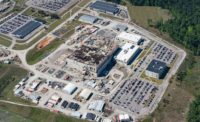Lawsuits
DOJ: MOX Supplier Schemed to Provide Deficient Rebar
The U.S. Dept. of Justice has intervened in a suit originally filed under whistleblower provisions of the False Claims Act.

A company hired to supply nuclear construction-grade rebar to the Mixed Oxide Fuel Fabrication Facility, or MOX, project at the Savannah River Site near Aiken, S.C., instead knowingly substituted standard, commercial-grade rebar that it then falsely certified met the Nuclear Quality Assurance-1 specifications, the U.S. Dept. of Justice claims in a lawsuit. The DOJ intervened in the lawsuit originally filed under whistleblower provisions of the False Claims Act.
Denise Vaughn, a spokesperson for Energy & Process Corp. (E&P) of Tucker, Ga., told ENR, “We are very disappointed to learn of the filing. We deny any wrongdoing, and look forward to presenting our case.” The MOX project began construction in 2007, with an original completion date of 2016. The Dept. of Energy claims the project is as much as $12 billion over budget, and likely still years away from completion.
According to the suit, the project’s prime contractor, MOX Services, awarded Energy & Process Corp. (E&P) two subcontracts to provide NQA-1 Rebar that cumulatively totaled nearly $11.5 million. According to the government, E&P was paid approximately $3,400 per ton for material the supplier asserted to be NQA-1 rebar. However, the legal suit filed Sept. 22 alleges the material was actually commercial-grade reinforcing steel that sold for roughly $750 per ton at the time.
“Despite promising to supply NQA-1 Rebar, and billing for millions of dollars in rebar that E&P certified was NQA-1 Rebar, in truth, E&P did not perform the work to supply NQA-1 Rebar,” the suit states, continuing: “Instead, E&P simply purchased commercial-grade rebar from a third party manufacturer and had it shipped directly from the manufacturer to the MOX Facility—without the required and vital quality assurance work ever having being performed.”
More specifically, the filings assert: “E&P simply paid a company called Commercial Metals Company (CMC)—which fabricates only commercial-grade rebar, and lacks the credentials and capacity to perform NQA-1 quality assurance work—to manufacture rebar for use in the MOX Facility.” E&P then instructed CMC to ship the commercial-grade rebar directly to the MOX project for installation, with the first of these shipments delivered to the job site in January 2007.
Additionally, the lawsuit alleges that E&P “explicitly and falsely certified that the rebar complied with the quality assurance requirements.” In all, the government claims one-third of the rebar that E&P supplied to the MOX project proved deficient.
On Sept. 23, U.S. Assistant Attorney General Benjamin C. Mizer stated: “The Department of Justice is committed to ensuring that construction suppliers who are paid a premium to meet high safety standards actually supply the goods and perform the work for which they are paid. When contractors cut corners, they not only cheat American taxpayers, but they also can put public safety at risk, particularly when their misconduct affects a facility that houses and processes nuclear materials.”
The lawsuit, United States ex rel. Cook v. Shaw Areva Mox Services, LLC, et al., was originally filed by Deborah W. Cook, a procurement and subcontract specialist formerly employed by the prime contractor, now known as CB&I Areva MOX Services. Cook filed the lawsuit under whistleblower provisions of the False Claims Act.






